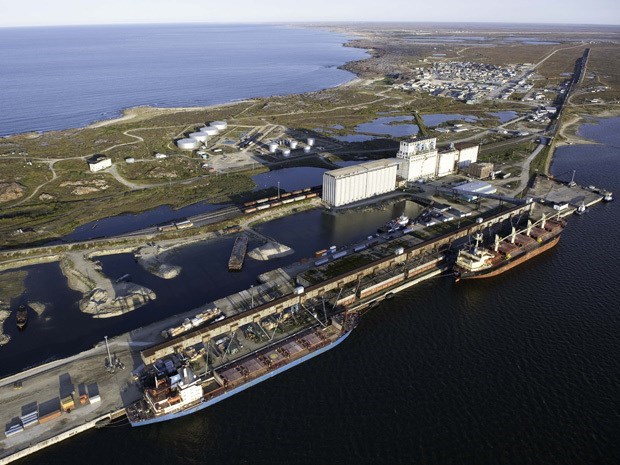In what appears to have almost become a litmus test through which small-c conservative politicians, many of whom are also big-C conservatives, can establish their bona fides, the prospect of shipping crude oil through Northern Manitoba and eventually across the Atlantic Ocean by way of Churchill has once again made news.
This time, the idea was floated by newly selected Alberta Premier Danielle Smith who wrote to Manitoba Premier Heather Stefanson (a lot of provinces get their first female premiers when a male leader steps down due to unpopularity, which seems somewhat bittersweet but that’s a topic for a different editorial) and Saskatchewan Premier Scott Moe to suggest that they all meet in Churchill to discuss the idea of shipping crude oil and other things along the Hudson Bay Railway and out through Hudson Bay.
Setfanson reacted somewhat lukewarmly to the idea when questioned about it at a press conference on Oct. 31, but Moe would almost certainly be in favour, having created a government committee in 2020 to look at pipelines and other ideas, including those that would potentially create access to the ocean through Hudson Bay’s port town.
Earlier in the year, then leadership hopeful and now federal Conservative Party leader Pierre Poilievre said during his campaign that he would pre-approve permits to export oil through Churchill, which seems like it could be meaningless as, back in 2013 when former Port of Churchill owner OmniTrax was considering whether it could diversify and expand its business by shipping crude oil along its railway and through its port, Transport Canada said that there were no permits required to do so, other than ensuring compliance with acts governing the transport of dangerous goods on trains and having a plan in place to deal with any spills that would post a threat to the environment that occurred at the port. At that time anyways, special permits wouldn’t have been needed, not from the prime minister anyways, so promising to pre-approve them is a bit like promising to breathe as long as you are alive — self-evident and unnecessary.
About five years ago, an aspiring United Conservative Party leader in Alberta said the province should buy the port and railway, which at that time were in the midst of an 18-month shutdown caused by flooding that damaged tracks. Though OmniTrax ultimately did sell the port and rail line, it wasn’t to the government of Alberta but to a group made up of Northern Manitoba First Nations, other communities in the province’s north and also some in Nunavut, which rely on goods shipped out fo the port for supplies.
All of this seems performative, the Canadian equivalent of U.S. Republicans vowing to let companies drill for oil in Alaska wildlife refuges, not because it’s actually really going to happen, but as a way to signal their “open-for-business, get the federal government the hell out of the way” attitude that marks them as truly conservative. Fittingly, Canada’s version is less dramatic and can’t even seem to enthuse the Conservative premier of the province where the port and rail line are located, entities which her government pledged this summer to support with as much as $73 million, a sharp contrast to her predecessor, who didn’t give OmniTrax any funding, even when the lack of train service shut down Churchill and, effectively, the port, for over a year.
The current owners have expressed some interest in shipping CanaPux, a floating, non-oily product made by combining petroleum with plastic, but the idea of shipping large quantities of crude oil out though Churchill has been moribund for more than eight years, dating back to the summer of 2014, when OmniTrax abandoned plans to test the market for oil shipments by sending a trial run of 330,000 barrels, an idea it had kicked around for more than a year. OmniTrax didn’t say at the time that it abandoned those plans what exactly dissuaded them. There was opposition, not only from the provincial government of the day, but also from First Nations in the region and environmentalists, all of whom were pretty much powerless to do anything legal to actually derail OmniTrax’s plan. That the company decided against even trying, perhaps because the equipment at the port could only pump oil into tankers at about a third of the rate the owners wanted it to, could be an indication that perhaps they just realized the market wasn’t there and opted against throwing good money after bad.
The ground under the rails didn’t get any better since then — it’s probably gotten worse — and the some of very First Nations who have objections to sending oil along a notoriously unreliable railway that goes through their traditional territories, are now part-owners of the line and port themselves. Would economics make them rethink these objections? It’s possible but Northern Manitoba First Nations also have enough experience to know that the benefits promised from exploiting natural resources don’t always trickle down to them.
Is it particularly likely that an pipeline will be built to Churchill? No. Are the economics of shipping oil and other goods out through Churchill much better than they were eight years ago? Maybe, Danielle Smith seems to think so . But its certainly easy approve of a pipeline through some else’s backyard than through your own or to suggest an unlikely if not far-fetched proposal without, say, checking if the owners are even interested in your idea. It’s possible that some day oil may be shipped out of Canada via the Port of Churchill but, then again, the railway and port have spent a great deal of their existence being on the cusp of greatness without ever actually getting there.



